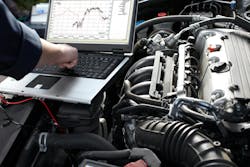Right to Repair: Views from the Biden Administration, the Federal Trade Commission, and the agriculture industry
“Right to Repair” is currently a prevalent issue across industries—from small electronics and home appliances to agricultural equipment and automobiles. In many cases, the advent of new technology has prompted some original equipment manufacturers to restrict access to the tools and information necessary for repairs.
In July of 2021, President Joe Biden signed the “Executive Order on Promoting Competition in the American Economy” that directed the Federal Trade Commission (FTC) to craft rules enforcing the consumer right to repair. In the months since this order was signed, President Biden has spoken on right to repair on multiple other occasions. At the American Farm Bureau Conference in January, the President reiterated his support, saying that family farmers and ranchers deserve the right to repair the equipment they own, either themselves or at an independent shop.
President Biden also spoke before a meeting of the White House Competition Council, saying, “Too many areas, if you own a product… you don’t have the freedom to choose how or where to repair the item that you purchased. Denying the right to repair raises prices for consumers and means independent repair shops can’t compete for your business.” The White House Competition Council was created as part of the Executive Order and is chaired by the head of the White House National Economic Council.
There are currently two lawsuits filed against agriculture equipment manufacturer John Deere alleging that the company’s proprietary tractor software is creating a monopoly that unfairly disadvantages small farmers. In these cases, farmers were given only one option for repair of their malfunctioning agricultural equipment—the John Deere technician. Historically, farmers have had the option to repair their equipment themselves or take the equipment to an independent repairer. However, according to these suits, John Deere has restricted access to the software and tools necessary to repair this equipment, often resulting in more costly repairs for the consumer.
These cases allege that John Deere has violated the Sherman Antitrust Act by creating a monopoly—stifling competition in the tractor repair market, driving up prices, and forcing small independent repairers out of business. John Deere committed to making their software and equipment available by January 2021, but to date, these suits allege, has not followed through on this commitment. This month, U.S. Senator Jon Tester introduced the “Agriculture Right to Repair Act” which, if passed, would guarantee farmers the right to repair their own equipment and work to end current restrictions on the repair market.
Prior to the Executive Order on Promoting Competition, the Federal Trade Commission (FTC) released a report entitled “Nixing the Fix.” This report provided a comprehensive review of “how manufacturers may limit repairs by consumers and repair shops, and how those limitations may increase costs, limit choice, and impact consumers’ rights.” In July, the FTC unanimously adopted a policy statement on repair restrictions. The statement affirmed that the commission would devote more enforcement resources to combat practices by manufacturers that impede third-party and self-repair.
On Capitol Hill, industry groups such as the American Alliance for Vehicle Owners’ Rights (AAVOR), whose members include the Automotive Service Association (ASA) and the American Car Rental Association (ACRA), among others, are working for a legislative solution to the issue of vehicle data access. This month, AAVOR submitted a statement before the U.S. House Transportation and Infrastructure Committee’s hearing on “The Road Ahead for Autonomous Vehicles” reaffirming the importance of vehicle data access not only for the autonomous vehicles of the future, but for all vehicles on the road today.
In November 2020, The Massachusetts Right to Repair Law Vehicle Data Access Requirement Initiative passed in a 75 to 25 percent popular vote through a public referendum. This ballot initiative required manufacturers to make telematics data wirelessly accessible by vehicle owners and independent repairers, beginning with model year 2022 vehicles. The referendum has been challenged in federal court by the Alliance for Automotive Innovation, where it remains in litigation.
The judge was initially expected to issue a verdict last November. However, in response to the legislation, Subaru disabled the telematics in all their 2022 vehicles in Massachusetts, raising questions on the enforceability of the ruling. Since then, automaker Kia has disabled their telematics system as well. To date, the case in Massachusetts remains open.
It is essential that independent repair shops retain access to the vehicle data, tools, and equipment necessary to repair cars that consumers bring to their shops. However, the correct pathway forward, whether it be state legislation, federal legislation, FTC regulation, or industry agreement, remains to be seen.
About the Author
Madi Hawkins
Madi Hawkins works as a Washington D.C. representative of the Automotive Service Association (ASA). She is a recent graduate of Vanderbilt University, where she graduated with a B.A. of Public Policy Studies.

